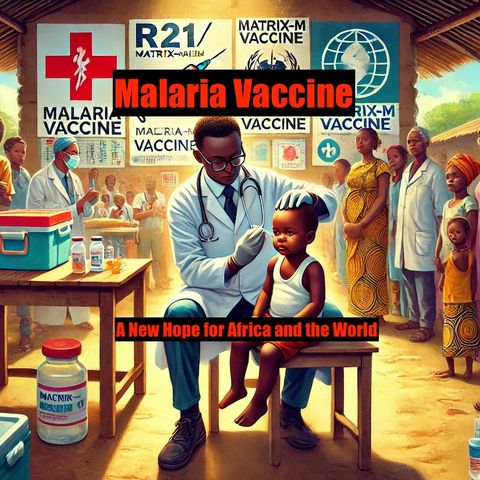Groundbreaking Malaria Vaccine Introduced in Africa, Revolutionizing Global Health

Scarica e ascolta ovunque
Scarica i tuoi episodi preferiti e goditi l'ascolto, ovunque tu sia! Iscriviti o accedi ora per ascoltare offline.
Groundbreaking Malaria Vaccine Introduced in Africa, Revolutionizing Global Health
Questa è una trascrizione generata automaticamente. Si prega di notare che non è garantita la completa accuratezza.
Descrizione
In a historic move to combat one of the deadliest diseases, Africa has introduced the world's first malaria vaccine, marking a groundbreaking step in global health and the fight against...
mostra di piùMalaria, transmitted through the bites of infected Anopheles mosquitoes, is one of the most severe public health challenges, particularly in Sub-Saharan Africa. The disease is a major killer of children under five years old, claiming the life of one child every two minutes. According to the World Health Organization (WHO), there were an estimated 241 million cases of malaria worldwide in 2020, resulting in about 627,000 deaths, with the majority of cases and fatalities in Africa.
The rollout of the new vaccine, known scientifically as RTS,S, comes after the WHO endorsed its widespread use among children in Sub-Saharan Africa and other regions with moderate to high malaria transmission. The vaccine was developed through a partnership between GlaxoSmithKline (GSK) and the PATH Malaria Vaccine Initiative, with support from the Bill and Melinda Gates Foundation.
RTS,S works by targeting the Plasmodium falciparum parasite, the most deadly malaria parasite globally and the most prevalent in Africa. Clinical trials have shown that the vaccine can prevent approximately four in ten malaria cases and significantly reduce severe, life-threatening instances of the disease. This efficacy level, while not perfect, represents a critical tool in the arsenal against malaria, particularly when combined with other preventive measures, such as bed nets and effective antimalarial treatments.
The introduction of the RTS,S vaccine into routine immunization programs began in three African countries: Ghana, Kenya, and Malawi, under a pilot program coordinated by the WHO. These pilot programs have reached more than 800,000 children since their initiation in 2019, offering crucial data on the vaccine's broader implementation and impact.
What sets this vaccine apart is its ability to complement existing tools and strategies to prevent malaria. Health experts emphasize that while the vaccine is a powerful tool, it is not a stand-alone solution. It needs to be used in conjunction with other preventative measures to substantially cut down the incidence of malaria.
The impact of the RTS,S malaria vaccine extends beyond just health benefits; it has significant economic and social implications for countries burdened by malaria. The disease costs African economies billions of dollars annually in direct medical costs and lost productivity due to sickness and death.
The successful development and distribution of the malaria vaccine represent a beacon of hope and a testament to the power of scientific innovation and international collaboration. As vaccine coverage expands and integrates into national health systems, it is expected to dramatically reduce child mortality and alleviate the heavy burden malaria places on vulnerable populations.
Informazioni
| Autore | QP-4 |
| Organizzazione | William Corbin |
| Sito | - |
| Tag |
Copyright 2024 - Spreaker Inc. an iHeartMedia Company

Commenti